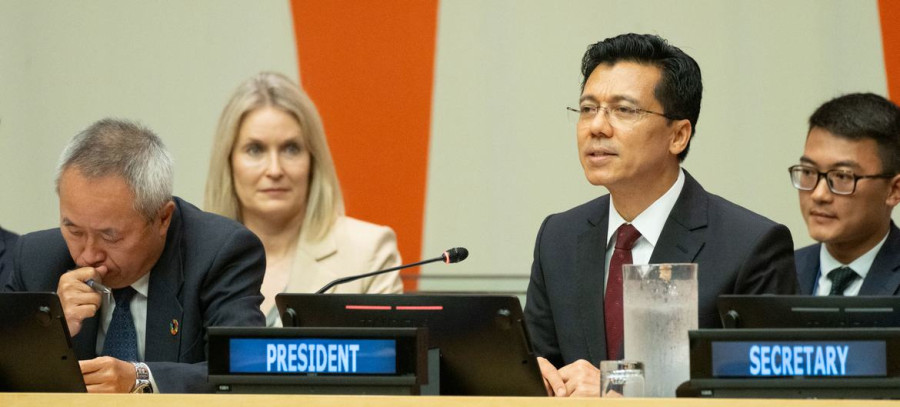National
Nepal’s Lok Bahadur Thapa elected president of UN Economic and Social Council
Thapa says ECOSOC must ‘deliver better’ to restore trust in multilateralism and drive global progress.
Post Report
Nepal’s Permanent Representative to the United Nations Lok Bahadur Thapa was elected president of the United Nations Economic and Social Council (ECOSOC) on Thursday, marking what he described as a ‘historic moment’ for Nepal and its commitment to multilateralism.
Thapa will lead the 54-member principal UN organ for a one-year term.
“Delivering better is not an option—it is an imperative,” Thapa told the Council, as quoted by UN News. “It is our pathway to restoring trust in multilateralism, bridging divides, empowering the most vulnerable and translating commitments into action.”
ECOSOC, one of the six principal UN organs, is tasked with coordinating the economic and social work of the United Nations system, including promoting the 2030 Agenda for Sustainable Development. It serves as a key platform for fostering dialogue, building consensus and encouraging action on pressing global challenges.
Thapa laid out five priority areas for his presidency—transforming agriculture to end hunger; promoting digital entrepreneurship and youth engagement; enhancing climate resilience with a focus on glacier lakes and floods; reforming the international financial architecture; and commemorating ECOSOC’s 80th anniversary.
“There are over 735 million people worldwide experiencing hunger,” Thapa noted. “We must strengthen rural resilience and transform agriculture.”
He said ECOSOC should harness the “youth bulge” in many developing countries by investing in digital innovation and entrepreneurship. On climate change, he called for tailored action that recognises the specific vulnerabilities of countries like Nepal.
Outgoing ECOSOC President Bob Rae, Canada’s ambassador to the UN, reflected on the urgency of the Council’s work amid global instability.
“We hear a lot in the UN discourse about how things are broken… But our job is to fix, to repair, to mend… to make change happen,” Rae said.
Thapa was elected alongside four vice-presidents for the coming year—Amar Bendjama of Algeria, Héctor Gómez Hernández of Spain, Wellington Darío Bencosme Castaños of the Dominican Republic, and Paruyr Hovhannisyan of Armenia.
“This council is our place,” Thapa said. “It needs dedication, participation and active engagement of all UN membership and stakeholders.”
Nepal’s presidency comes at a time of complex global crises, including accelerating climate change, rising geopolitical tensions and eroding trust in international institutions.
“These challenges are systemic and interconnected. They demand integrated, inclusive and forward-looking responses,” Thapa said. “We must reaffirm our collective belief in the power of multilateralism—not as an abstract ideal, but as a pragmatic tool for delivering better outcomes for all.”
Former chief secretary Shanker Bairagi, who also served as foreign secretary, has described Thapa’s election as a significant milestone for Nepal in the realm of multilateral diplomacy. “This opportunity has come amid multiple and mutually reinforcing global challenges,” Bairagi wrote on Facebook.
“Close collaboration and coordination between the agencies of the government of Nepal in the Capital and Permanent Mission in New York will be critical in making this presidency successful. In addition, meaningful partnership will also be required with UN member states and other stakeholders.”




 9.83°C Kathmandu
9.83°C Kathmandu













